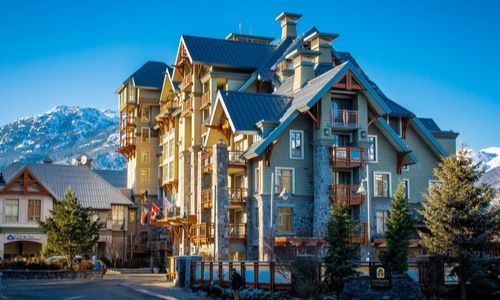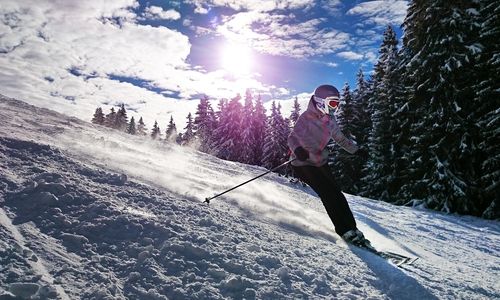Every country in the world has its unique quirks and cultural differences. Canada is definitely no different!
Read on to discover the Canadianisms that you should know about before heading to Canada to work a ski season. It’ll help prepare you and also help you get stoked for spending a winter in this awesome country!
This post includes some affiliate links. If you make a qualifying purchase through one of these links, I may receive a small commission at no extra cost to you.
Skiing in Canada
Canada is home to over 20 full service resorts and many more local ski hills. By ‘full service’ at least a couple of lifts, a restaurant, accommodation and more. Whistler Blackcomb is North America’s largest ski resort, with over 8000 acres of terrain
Runs are graded differently in North America. Greens are the easiest, then blues moderately difficult, black diamonds hard and double black diamonds hardest. Thinking of runs, you should know that not all runs are groomed. Some marked runs are just left to collect powder
If you’ve already worked a ski season elsewhere, throw out your expectations. Things in Canada will be different. For one thing, full-service chalets at the main ski resorts are a rarity
Unlike in Europe, it is not possible to ski from resort to resort. The only exception is Whistler Blackcomb, which is used to be two separate ski resorts.
The apres-ski and non skiing activities on offer can be varied. Some ski towns won’t have much more than a pub or restaurant, while the larger resorts have dozens of places to eat plus opportunities to go ziplining, ice climbing, ice fishing, snowshoeing and more.
Everything within the ski resort boundaries is safe (as it can be) to ski.
Backcountry skiing in Canada offers truly incredible opportunities to explore mountain ranges visited by few others, outside the boundaries of the resorts. The catch is that you need serious experience, training and equipment to do it. It is not quite the same as going off-piste in Europe.
Tree skiing is a big thing here, with most ski runs being located below the tree line. Weaving through the forest can be especially fun on a white-out day or when looking for powder stashes. Wooded areas are patrolled but you must be aware of the dangers of tree wells.
Living costs in Canada
Canadian price tags do not include taxes. So when you buy something, the price you see on the label is not the price you pay. There is a 5% federal tax (GST) on almost everything and then most provinces add on another tax on top. In BC, this is another 7%. Some provinces also have a liquor tax.
There is a tipping culture in Canada. It’s not quite the same as in the US, where service staff often have ridiculously low wages. The minimum wage for servers is usually a dollar or so less than the regular minimum wage but this is being phased out. Even so, tipping 15% on sitdown meals is normal.
Living costs in Canada are reasonably high compared to the minimum wage, which floats at around $15-$17.40/hour in most provinces.
Canadians love to drink beer. In a bar or brewery, a ‘pint’ usually costs around $6-8. At the liquor store (yep, alcohol sales are carefully regulated), a case of 12 cans is around $25 (again, it depends on the province).
Phone calls
With Canada being so big, if you are calling someone outside your current local area (or you are away from your phone’s registered local area and you receive a call) it is actually a long distance call.
Long distance calls need to start with +1
Long distance calls are usually more expensive, but count the same in plan minutes
It costs money to both make and receive phone calls. If you have available minutes, these will be used instead.
Canadianisms You Need to Know
Unique Canadian items
BeaverTail – Fried pastry dough in the shape of a beaver’s tail
Caesar – Bloody Mary with clam juice (yes really!)
Chinook – Warm wind that comes over the mountain in the dead of winter (common in Alberta)
Double-double – coffee with two creams and two sugars
Homo milk – Homogenized milk
Hydro bill – Electricity bill
Kraft Dinner – box macaroni cheese
Loonie – $1 coin
Mickey – 375ml bottle of liquor
Timbit – doughnut hole from
Toonie – $2 coin
Toque – knit hat or beanie (rhymes with ‘fluke’)
Two-four – case of 24 beers
Canadian places
Canadian Tire – Large automobile, household and sports shop chain
RCMP – Royal Canadian Mounted Police, national police service of Canada
Service Canada – Government office for all things federal such as Social Insurance Numbers
Service [province name] – Government office for all things provincial e.g. Service BC
Tim Hortons – Iconic coffee and doughnut shop chain, named after a hockey player
Unique Canadian slang
Canuck – Canadian
Eh? – Can be used as “what?” ‘huh?” or “right?”
Gong show – Something that was or is a total disaster
Give’r – “Go hard!”
Keener – Suck up
Klick – Kilometre
Line – Queue
Snowbird – Canadian who travels south for the winter
Washroom – Bathroom/restroom/toilet
Work related terms
Bondable – Being bondable means to pass a background check. This is most often asked for jobs that involve finance or security
CSC – Child Safe Canada, a provider of first aid training specifically for those looking after children
CRC – Criminal Records Check, the most basic criminal history check in Canada. Obtained from the RCMP station and requires fingerprints.
Food Safe – A BC food safety training program that is often required by employers for anyone working with food. There are equivalents in Alberta and Ontario.
Lead Hand – A lower level supervisor
Pro Serve – Alberta’s mandatory course for liquor servers
Red Seal – This is a certificate of apprenticeship for tradesmen. At a ski resort, you’re most likely to hear of Red Seal endorsement being required for chefs
Serving It Right – BC’s mandatory course for liquor servers
SIN – 9 digit Social Insurance Number required to work in Canada
Vulnerable Sector Check – Specific police check for people working with children or other vulnerable persons
Planning a ski season in Canada? Here are some helpful resources
Secure your working holiday visa – your first step to an amazing ski season in Canada is to apply for the IEC program
Research Canadian ski resorts and apply for work – Get the low down on Canada’s huge range of ski resorts and learn tips and tricks for finding a job
Book arrival accommodation – It’s a smart idea to spend at least a few days in whichever Canadian city you land in. Booking.com usually offers the best rates for hostels and hotels
Don’t forget travel insurance – A mandatory part of the IEC working holiday program in Canada, travel insurance also protects you against serious medical care costs in case of illness or injury. I have personally used True Traveller
Get prepared for arrival in Canada – This moving guide includes everything you need to know about immigration, getting a local Canadian number, opening a bank account and more
Related posts


